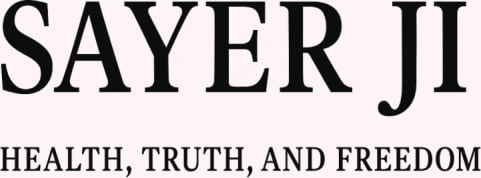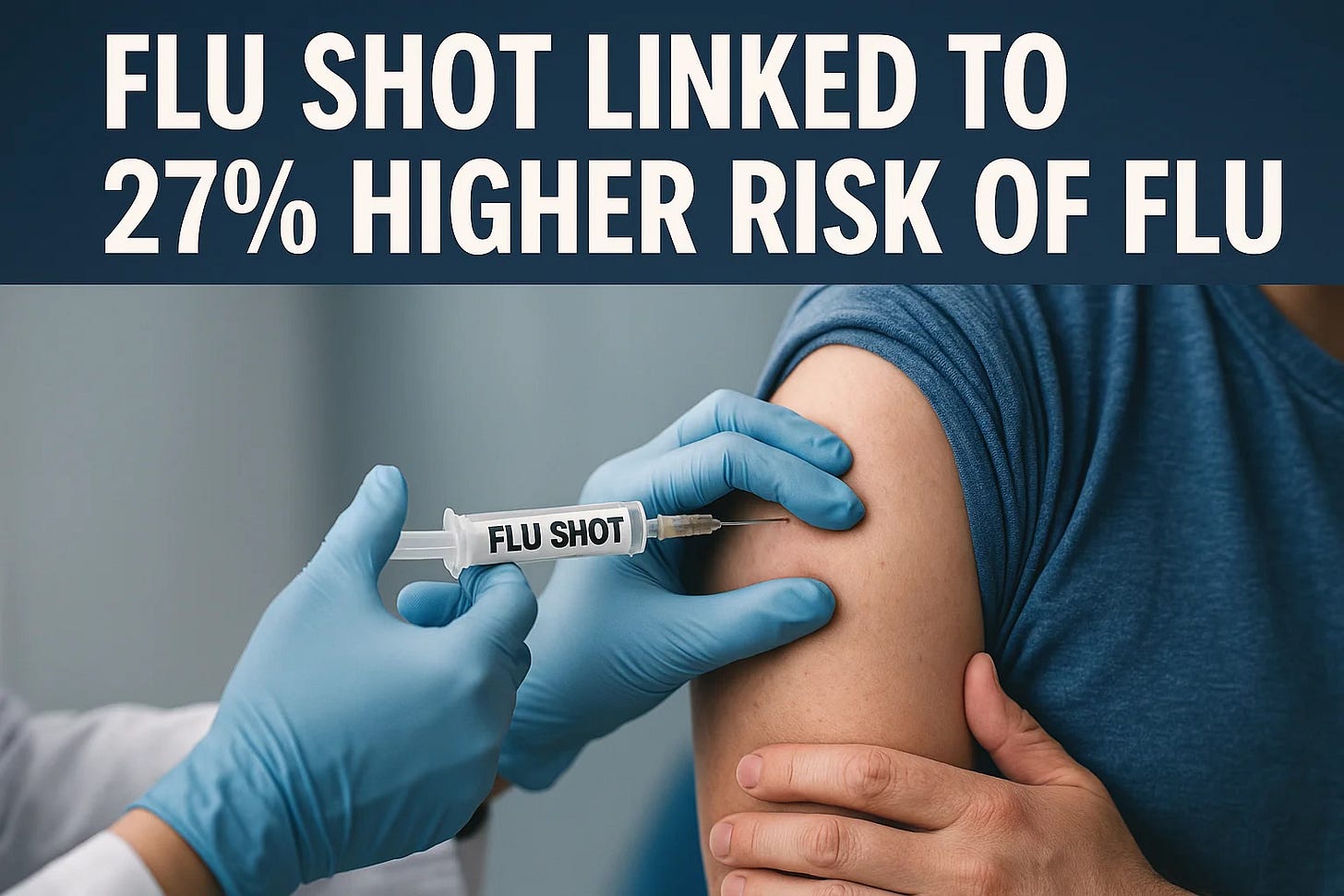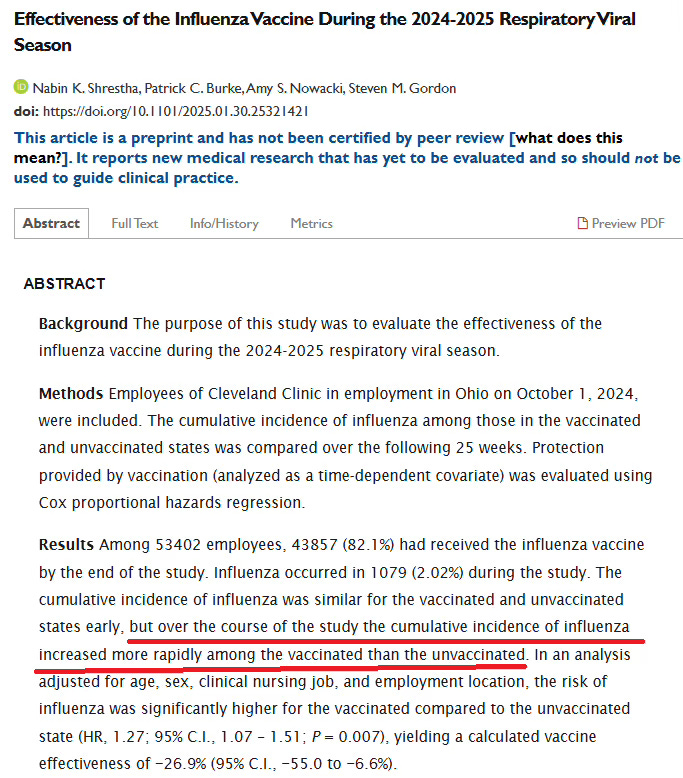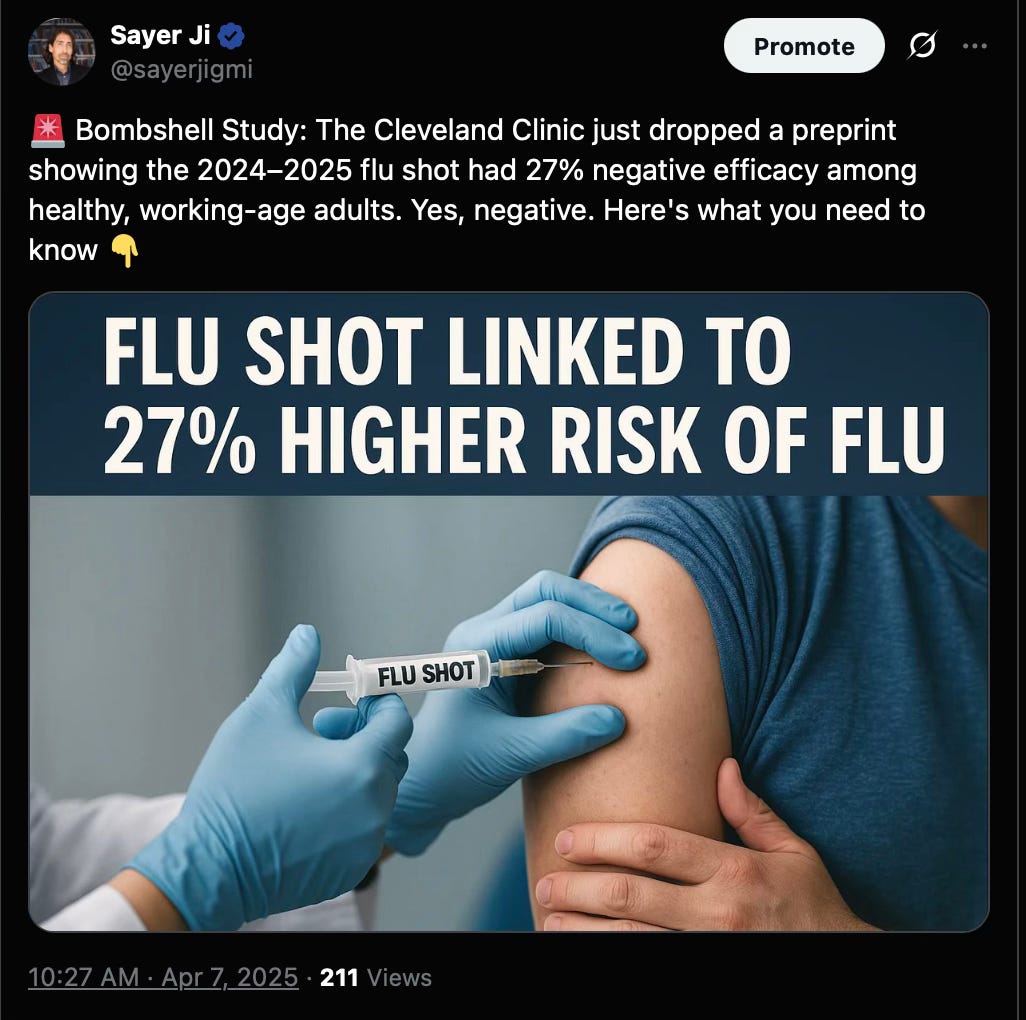Bombshell Study Reveals 27% Negative Efficacy of 2024-2025 Influenza Vaccine Among Working-Age Adults
Groundbreaking Cleveland Clinic study finds flu vaccine may heighten, not reduce, infection risk in healthy adults.
A newly released preprint study from the Cleveland Clinic has sparked international attention by reporting that the influenza vaccine for the 2024–2025 season was not only ineffective among a large population of working-age healthcare employees—it was associated with a higher risk of infection.
The prospective cohort study, titled "Effectiveness of the Influenza Vaccine During the 2024–2025 Respiratory Viral Season," analyzed health outcomes among 53,402 employees of the Cleveland Clinic Health System in Ohio. The study covered the 25-week period beginning October 1, 2024, and tracked influenza incidence among vaccinated and unvaccinated individuals.
Key Findings
82.1% of participants (43,857 individuals) received the trivalent inactivated influenza vaccine.
A total of 1,079 employees (2.02%) contracted influenza during the study period.
The cumulative incidence of influenza increased more rapidly among the vaccinated than the unvaccinated as the season progressed.
Statistical analysis using Cox proportional hazards regression showed that the vaccinated group had a 27% higher risk of contracting influenza compared to the unvaccinated group.
Hazard Ratio (HR): 1.27
95% Confidence Interval: 1.07 – 1.51
P-value: 0.007
The calculated vaccine effectiveness was –26.9% (95% CI: –51.0% to –6.6%), indicating a statistically significant negative effectiveness.
Study Strengths and Limitations
The study design allowed for precise risk calculations, treating vaccination status as a time-dependent variable. Unlike traditional "test-negative" studies that rely on odds ratios and can exaggerate results, this approach provides a more accurate estimate of real-world effectiveness.
However, the study is limited in its scope to:
Predominantly healthy, working-age adults
Use of a single vaccine formulation (inactivated trivalent)
No analysis of influenza severity, hospitalization, or mortality
Exclusion of home testing and non-Cleveland Clinic data sources
Implications
This research challenges the assumption of consistent annual effectiveness of seasonal influenza vaccines. It calls into question public health policies that promote or mandate influenza vaccination without annual evidence of benefit. According to the authors, it may be unreasonable to expect high efficacy year after year given the evolving nature of influenza viruses and the months-long lead time required for vaccine development.
While the authors caution against generalizing beyond the studied population, they emphasize the importance of conducting rigorous, real-time evaluations of vaccine performance—especially when vaccines are being promoted as a cornerstone of public health strategy.
Conclusion
For the 2024–2025 respiratory viral season, the Cleveland Clinic’s data suggest that influenza vaccination not only failed to prevent infections among its staff but may have inadvertently increased risk. As always, we urge readers to evaluate the latest data critically when making personal health decisions.
Source: medRxiv Preprint, DOI: 10.1101/2025.01.30.25321421
Learn more about the unintended, adverse effects and efficacy issues of influenza vaccines on the Greenmedinfo.com database here: Flu Vaccines.
Learn more about natural, preventive methods to address influenza here: Influenza.
Share this post on X, and elsewhere…
X Post: https://x.com/sayerjigmi/status/1909251641599017370
Telegram: https://t.me/sayeregengmi/9060
Instagram: https://www.instagram.com/share/_3L-SGlgc
Facebook: https://www.facebook.com/share/p/15ZiTBFwfX/?mibextid=wwXIfr







Before 2019 had the flu every year, for years thought it was from working as a RN, then retired in 2014, and still got sick with respiratory illnesses, bronchitis, treated with antibiotics, inhalers, codeine, doc even thought maybe some COPD. I have not taken the flu shot since 2019 and I have not been ill once, not even a cold. Had chest X-ray done for a cough I developed as side effect of withdrawing from Effexor, perfectly clear, no sign of disease. I will never, ever have a flu shot and neither will my family. The flu shot was directly related to all my years of illnesses.
I experienced immune exhaustion after reacting to a hospital mandated flu vaccine in 2012. About a month later I was down and out of work from pneumonia.
It was a very bad policy imo and exemptions, mine was denied, were narrowly defined. Vaccines should never be mandated by any agency or organization.